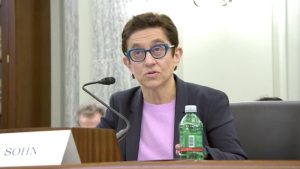This month Georgia Institute of Technology (Georgia Tech) soft-launched the Zoom video collaboration platform for students, faculty, and staff.
The National Counterterrorism Center (NCTC) has released a new mobile app – dubbed aCTknowledge – that shares unclassified counterterrorism reports, analysis, training resources, and alerts.
Tens of millions of viewers around the nation will flock to television screens and plates of buffalo chicken dip this weekend for the Super Bowl. Every year, the game also brings tens of thousands to the stands and hundreds of thousands to the host city’s bars and viewing establishments.
The Senate Commerce, Science, and Transportation Committee held a second hearing Feb. 9 on the nomination of Gigi Sohn to become an FCC commissioner, which produced little in the way of new information about her qualifications for the position, and not much insight into when or whether the Senate may take action to confirm the nomination.
The Federal Communications Commission (FCC) said it plans to commit nearly $125.9 million in its ninth wave of Emergency Connectivity Fund (ECF) program support.
Federal Communications Commission (FCC) Chair Jessica Rosenworcel today announced the formation of the task Force to Prevent Digital Discrimination, a cross-agency task force that will focus on creating rules and policies to combat digital discrimination and to promote equal broadband access nationwide.
The state of Washington’s Department of Labor (DoL) confirmed that it detected “suspicious activity” during the week of Jan. 24 indicating a cyberattack targeting the state’s professional and occupational license data.
While college professors expressed significant concerns over academic integrity in online courses at the onsite of the COVID-19 pandemic, those concerns have dropped as distance learning has expanded and professors have become more comfortable with the teaching modality.
According to a new survey, the majority of K-12 teachers are paying out of their own pockets for ed tech for their classrooms and students.
San Diego State University (SDSU) has launched the Virtual Immersive Teaching and Learning (VITaL) Research Center, which is dedicated to expanding the use of emergent virtual technologies in the classroom.












